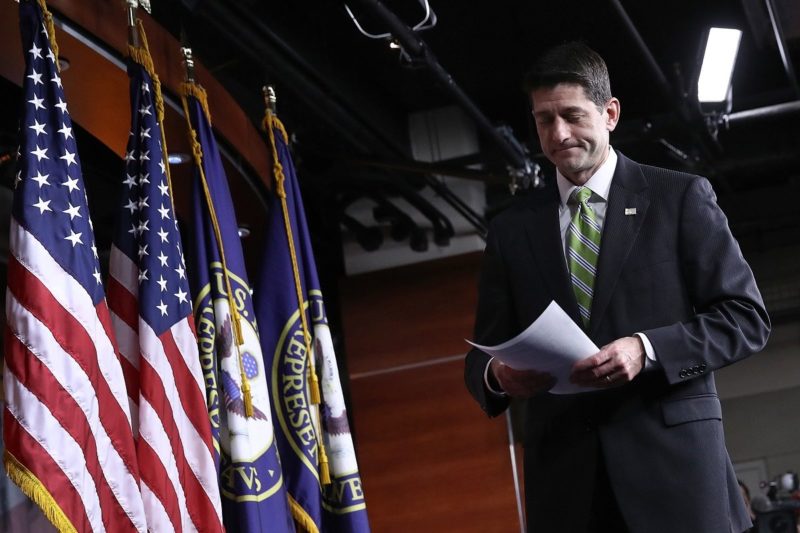Obamacare Lives as Republicans Yank Unpopular Health-Care Bill
After a day of “will they, won’t they” negotiations on Capitol Hill and at the White House, GOP leaders couldn’t muster the 215 votes needed for passage.

Congressional Republican leaders’ last-minute withdrawal of their embattled Affordable Health Care Act (AHCA) on Friday delivered a stunning legislative defeat to the GOP and President Donald Trump over their mutual vow to repeal Obamacare.
Republicans in the U.S. House of Representatives walked away from their bill seven years and one day after President Obama signed his signature health-care reform law. With Obamacare the law of the land, Trump, who campaigned heavily on repeal, fell short in his first 100 days in office.
Trump gave House Republicans an ultimatum on Thursday evening: Hold a vote on Friday or prepare to leave Obamacare in place—indefinitely. But after a fraught day of “will they, won’t they” negotiations on Capitol Hill and at the White House, GOP leaders still couldn’t muster the 215 votes needed for passage.
Trump then backtracked, reportedly telling House Speaker Paul Ryan (R-WI) to pull the bill shortly before the vote was set to begin. Ryan cast the decision as his own during a late-afternoon press conference.
Pulling the AHCA keeps the current version on life support while Republicans plot the way forward. Had it been voted down, the House would have had to start over on a new sweeping repeal-and-replace plan or attempt more piecemeal efforts.
Even so, the current form is effectively dead.
“We’re going to be living with Obamacare for the foreseeable future,” Ryan said at the Friday press conference.
The AHCA was widely seen as dead on arrival in the U.S. Senate despite needing a simple 51-vote majority to pass, using a fast-track process known as budget reconciliation. A handful of rank-and-file Senate Republicans opposed the bill’s initial plan to end Medicaid expansion in 2020, which was later revised to end in 2018. And conservatives like Sen. Rand Paul (R-KY) didn’t think “Obamacare Lite” went far enough.
House GOP leaders piled on sweeteners to draw support from the ultra-conservative House Freedom Caucus, along with virulent anti-choice members who wanted the National Right to Life-endorsed legislation to double down on abortion restrictions. Ryan agreed Monday to hasten the demise of Medicaid expansion and by Wednesday, to sacrifice guaranteed maternity care and other “essential health benefits” in an effort to bring aboard more of the holdouts.
The concessions weren’t enough to appease Freedom Caucus members demanding an end to still more popular Obamacare requirements, such as covering people with preexisting conditions and allowing people to remain on their parents’ insurance until age 26.
Trump tried to remind Freedom Caucus members that passing the bill was their only shot at “defunding” Planned Parenthood for one year—in other words, cutting off Medicaid beneficiaries from obtaining quality, affordable health care from the organization’s affiliates.
“The irony is that the Freedom Caucus, which is very pro-life and against Planned Parenthood, allows P.P. to continue if they stop this plan!” he said in a tweet.
Planned Parenthood Federation of America slammed the president for playing politics on social media.
“Negotiating away access to cancer screenings, birth control and maternity care is not ‘pro-life,’ it’s cruel,” Executive Vice President Dawn Laguens said in a statement.
Freedom Caucus members may have been willing to take the political gamble thanks to powerful conservative allies. The billionaire Koch brothers were prepared to spend millions to shield congressional Republicans who vote against “Obamacare 2.0” from the White House’s wrath.
Ryan and company alienated moderate Republicans who informally caucus as the Tuesday Group. Rep. Charlie Dent (R-PA), one of just two Republicans last month to vote against shredding Obama-era family planning protections, predicted that “this bill, in its current form, will lead to the loss of coverage and make insurance unaffordable for too many Americans, particularly for low-to-moderate income and older individuals.”
Rep. Rodney Frelinghuysen (R-NJ), chair of the powerful House Appropriations Committee, said the potential loss of health-care coverage was why he would vote “no” on the AHCA.
“Unfortunately, the legislation before the House today is currently unacceptable as it would place significant new costs and barriers to care on my constituents,” Frelinghuysen said in a statement. “In addition to the loss of Medicaid coverage for so many people in my Medicaid-dependent state, the denial of essential health benefits in the individual market raise serious coverage and cost issues.”
Reproductive rights advocates expressed relief at the bill’s de facto defeat.
National Partnership for Women & Families President Debra Ness called the failure of the AHCA “a victory for women’s health and women’s access to care.”
Gretchen Borchelt, vice president for reproductive rights and health at the National Women’s Law Center, echoed that sentiment.
“Today was a triumph over those who would have put women’s lives, health, and economic security at risk in the name of ‘reform,’ including blocking access to abortion, and stripping women of maternity coverage,” Borchelt said in a statement. “President Trump should keep his word that Congress should ‘move on’ if this attempt at repeal failed.”

